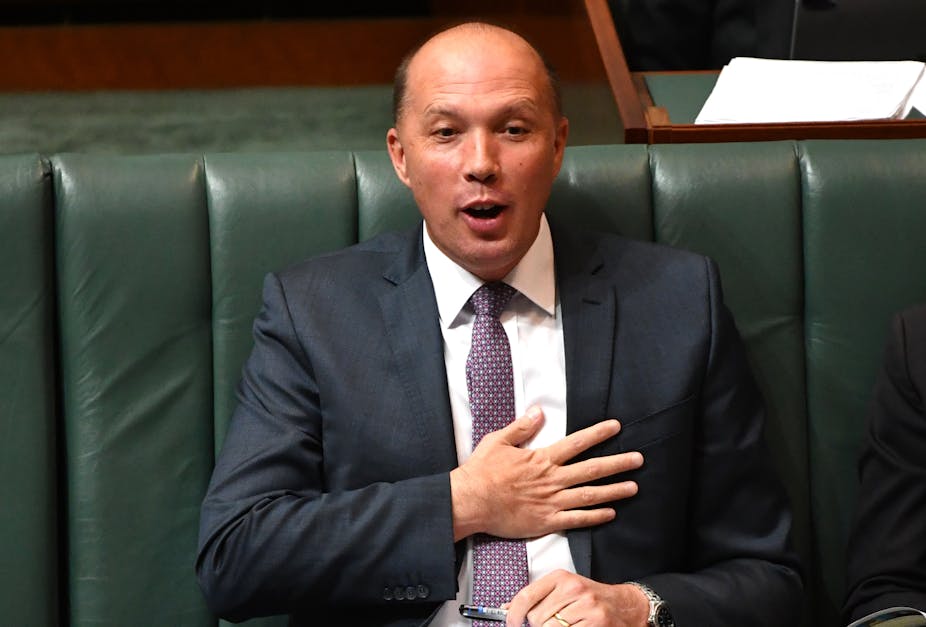The activist group GetUp has raised almost A$200,000 in less than a week for a campaign to unseat Immigration Minister Peter Dutton in his marginal Brisbane electorate of Dickson.
An email appealing for funds that was sent to about 350,000 GetUp members last Thursday received donations from more than 5,000 people. By Tuesday night, it had raised $196,911.
At the 2016 election a big GetUp effort helped cut Dutton’s margin from 6.7% to 1.6%. The swing against him was much greater than the statewide swing against the government of 2.9%. Dutton held on by fewer than 3,000 votes. In that election Labor had a very strong candidate in Linda Lavarch, a former Queensland attorney-general.
If Dutton lost his seat it would be a major blow to the conservative wing of the Liberal Party. He is a leadership aspirant, and would be an obvious contender if the Coalition lost the election.
Dutton is likely to receive some help next time in the form of the redistribution of boundaries before the election, which is due in 2019. But even with a favourable boundary change the seat would remain vulnerable to a significant swing.
The latest GetUp funds will be used for research in the electorate and, as the poll gets nearer, for various forms of advertising.
GetUp members in the area will be asked what issues should be highlighted and will be urged to engage face-to-face and by telephone with voters.
GetUp’s national director Paul Oosting stresses the importance of one-on-one contact. GetUp has an office in Brisbane and would expand it to train people in campaigning, he said.
Oosting said GetUp members felt Dutton’s views and values were not in line with those of most Australians.
He said that, as health minister, Dutton had pushed for hospital funding cuts, and accused him as immigration minister of misleading the public about incidents on Manus Island and Nauru. Dutton was against marriage equality and action on climate change, and wanted to purge the ABC, he said. “These views go beyond a party line.”
GetUp has pointed to its role in running campaigns against several right-wing Liberals who were defeated in the last election, including Andrew Nikolic – who lost his Tasmanian seat.
But Dutton says he is confident of holding on. “I’ve held the seat for 16 years against every left-wing campaign and I’ll defeat the left-wing GetUp union campaign at the time of the next election,” he said in response to the GetUp move.
“Anyone donating a dollar to GetUp should know they are nothing more than a front for the Labor Party, the Greens, and their other big benefactor – the CFMEU. They’re a left-wing political organisation and they spent $1 million in the seat of Dickson last time and I have no doubt they will continue the campaign this time.”
The pressure on his seat is likely to mean Dutton will have to spend a lot of time on his local campaign as the election gets close.
In the meantime he will be looking to enhance his ministerial position whenever Malcolm Turnbull reshuffles his team.
After Turnbull became leader, he removed Dutton – to whom he was not close – from the cabinet’s national security committee, but later restored him to it.
Government sources now remark how bonded Turnbull and Dutton appear to be, with Dutton acting as a protector for Turnbull on the conservative flank of the party.
One option for satisfying Dutton’s short-term ambition would be the creation of a homeland security portfolio, that would bring together Dutton’s present immigration and border security responsibilities and ASIO, currently under the attorney-general, and the Australian Federal Police, which comes under the justice minister. But there are differing views about the desirability of such a portfolio.
Turnbull is waiting for a review, due soon, of the Australian intelligence community being done by former senior public servants Michael L'Estrange and Stephen Merchant.
The review is examining the broad architecture of security and intelligence agencies, including whether the intelligence community “is structured appropriately, including in ensuring effective co-ordination and contestability”.

